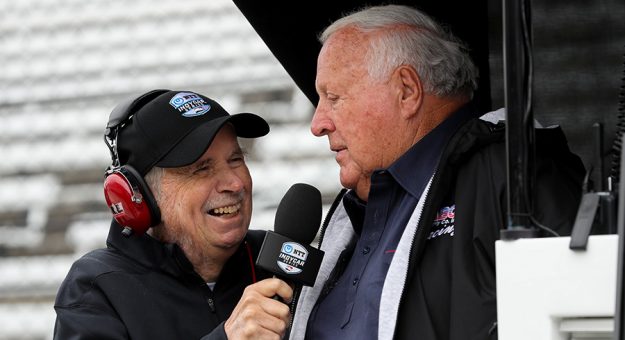CONCORD, N.C. — Heroes take many forms throughout a person’s life.
Some are larger than life; big and bold and always drawing your attention. Some are quiet; doing what they do almost behind the scenes. Some are combinations of the two.
Robin Miller was one of those who fit both categories, at least for me.
Growing up where I did, 50 miles northeast of Indianapolis, I knew of Robin from my earliest recollections concerning the Indianapolis Motor Speedway and Indy car racing. My father moved in the same circles, and when I got the opportunity to work my first Indy race as a teenager, Robin was a big part of adapting to the scope of what would become a lifelong passion for me.
Holding court as one of the two beat writers in Indy, Robin cut a big swath in the press room. Sitting there and listening to him work the room, I saw a side of the sport and of the month of May that I had yet to experience.
Known for his somewhat brash style, both as a writer and in person, Miller was like the legends of the NASCAR beat — Tom Higgins, Benny Phillips and Mike Mulhern to name a few — in that whatever he said, whether you agreed with it or not, you listened. I will admit, a lot of it was said for shock value or to see how someone would respond, but it was worth a listen before you made up your mind.
With the prevalence of the internet these days, writers like those above, in both IndyCar and NASCAR, are much less in evidence than they used to be. Every paper in Indiana had a presence at Indy for the month of May, or so it seemed, and a seat in the old press room attached to Gasoline Alley was a coveted perk. Robin had his own space at the rear of the building, as befitted his status with the hometown paper — and paper of record for the sport.
In his later years, with the decline of the printed word and rise of digital media, Robin switched to TV and, unsurprisingly, did a very good job for ESPN, SPEED and NBC. News is still news, no matter how it’s presented. Robin had sources all over the sport, so it stands to reason he’d be good on the tube.
As much as he was a media icon, he also got on some people’s nerves. One of the more famous incidents involved four-time Indy 500 winner A.J. Foyt and a trash can, which from reports at the time did not go well for Robin. Miller had sources claiming Foyt was cheating up his car for the 1981 Indy 500 and, if you know Super Tex, it was not well-received. There was a libel suit involved and punches were thrown.
That was the kind of reporter Miller was: unvarnished, bare-knuckled truth as he knew it to be, and he had the sources and the chops to pull it off. A recent column by Preston Lerner of Motor Sport magazine went into detail.
“A lot of people say, ‘I’ve got a wife and a couple of kids, and I’m going to ride the gravy train and write the same pabulum every week,’ Miller once told me (Lerner). Whereas me, I’ve never married. I’m a degenerate gambler. I don’t care if anybody likes me. I quit caring about that when I was 21 years old.”
Foyt and Miller made up, and Super Tex visited Miller prior to his death.
Robin will be missed. Two years ago, when his health began to decline thanks to leukemia and the lung cancer that finally caused his death, IMS created the Robin Miller Award to be presented each year to an unsung individual who has displayed “unbridled passion and an unrelenting work ethic to enrich the sport.”
Robin did that, though not always to everyone’s liking. Both IndyCar and CART, for example, pulled his credentials at one point or another, and he lost his job at the Star over something he’d written. For me, I’ll take as many Robin Millers as I can get, because he lived the life, dreamed the dream and brought the news — good and bad — to everyone he could.
Godspeed, old friend.
